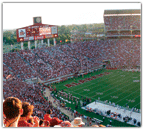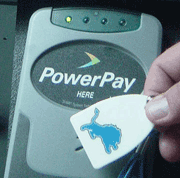Contactless ticketing takes hold in English football
25 July, 2006
category: Contactless, Financial, Library, Transit
 But don’t Bend (the Smart Card) Like Beckham
But don’t Bend (the Smart Card) Like Beckham
By David Wyld, Contributing Editor
When you think of British soccer, what images come to mind? In all likelihood, images of David Beckham artfully bending the ball into the goal and of rowdy English fans. What is increasingly being noticed is that soccer – or football – clubs in the United Kingdom are at the forefront of harnessing contactless card technology to the benefit of both teams and their loyal fans. Indeed, football clubs in the UK are fast transforming the notion of what it means to be a “season ticket holder,” as tickets are falling by the wayside in favor of smart cards. These contactless solutions are fast becoming the global benchmark for creating customer loyalty and bringing a form of yield management to the stadium.
While the 2006 FIFA World Cup ushered in a great deal of excitement about soccer in the U.S., it also served as the largest proving ground to date of integrating contactless into sports ticketing, with:
- 12 venues
- 64 games
- 3.5 million contactless paper tickets.
Yet, the real revolution in events management today is the prospect of eliminating the ticket altogether, replacing the paper ticket with a smart, contactless card.
StadiaCard helps Liverpool expedite access and reduce scalping
There are a number of competing firms today in the UK seeking to bring contactless solutions to bear in football stadiums in their country. Stadiacard, a division of the UK-based TelCo Management Limited, is working with several leading football clubs in the UK to prove the viability of a contactless card solution. Most notably, the Liverpool Football Club has been at the forefront, using contactless technology in its stadium since 2003.
For the upcoming 2006/2007 season, the Liverpool Club, winners of the 2006 FA Cup, will be shifting its season ticket buyers entirely to Stadiacard’s contactless solution, providing them with what they are branding as the Fan Card. Liverpool has equipped its historic Anfield Stadium, which dates back to 1884, with readers at all of its entry gates. The Liverpool Club believes that the system will not only speed entry of season ticket holders into the stadium, but also eliminate the possibility that these buyers could resell individual game tickets from their season-long package or provide them to “ticket touters” (scalpers). This is because the Fan Card will be required for entry throughout the season and thus, if sold, the season ticket purchaser would lose the right to enter the stadium for not just a single match or series of games, but the remainder of the season. While Anfield only has a capacity of 45,400 seats, the Liverpool club has issued more than 130,000 Fan Cards to date. Supporters who are not season ticket holders can use their Fan Cards as ID when purchasing individual game tickets via the phone or the Internet.
TeamCard solution helps clubs throughout the UK
A similar solution, also aimed for the football market, is being marketed by the St. Andrews, Scotland-based Scotcomms Technology Group. Scotcomms TeamCard contactless solution is being employed by several leading football clubs in the UK, including:
- Bolton Wanderers
- The Celtic (Glasgow)
- Chelsea
- Crystal Palace
- Everton
- Ipswich Town
- Millwall.
One of the significant benefits of such contactless ticketing is the ability of the sports’ team/club to derive incremental revenue from what would have been unused tickets by season ticket holders. One of the British football clubs making use of the TeamCard, the Bolton Wanderers, has turned a season ticket holder’s inability to attend a game into a “win-win” for all parties. Gareth Moores, a director of the club, estimates that 5-8% of season ticket holders can not attend a given game. The Bolton Club rewards season ticket holders who notify the organization in advance of their inability to attend a game with £10 worth of points loaded onto their TeamCard. These points can then be used for purchasing either refreshments in the club’s stadium or team merchandise from the club. The club is then able to resell that unused seat – for an average profit of £15. Likewise, football clubs have begun to offer seating upgrades to better sections on an availability basis to card holders, with the ability to charge their registered payment option immediately should they choose to sit in a better seat for an event.
There is also a significant security benefit to the use of contactless tickets for sporting events in general and for football specifically. Unlike with paper form tickets, if a fan’s ticket card is lost or stolen, the team can simply issue a replacement and cancel out the original lost item. Also, the team retains significant control over the use of the card, which is especially important in venues such as football in England, where crowd rowdiness and hooliganism has been of paramount concern in recent years. If a team can identify trouble making fans, they can simply deactivate that person’s contactless ticket card and ban them from the grounds. In the same fashion, as has been done in Liverpool since the 2003/2004 season, stadium security and support personnel have themselves been issued contactless cards, allowing for the club to maintain required staffing levels throughout the stadium and monitor staff movement for both management and payroll purposes.
Finally, since the fan’s card also operates as a form of payment in the stadium, the benefits of contactless payments at concessions and merchandise sales locations can be reaped. And, in the United Kindgom, unlike at sports venues in the United States, where sports betting is not legal in the stadium setting, fans can place wagers before and even during games using the same contactless ticket card.
Over the next five years, it is likely that we will see similar developments in the United States, both at professional and collegiate sporting venues. Out of a desire to heighten revenue and a need to increase security, sports executives will see that contactless cards offer a “win-win” proposition to both the team and its fans. While we have seen the development of co-branded contactless payment solutions for concession/souvenir payments, an all-inclusive smart card solution will likely emerge as the industry standard in time. Thus, the sports space presents tremendous opportunity for growth in the future.




